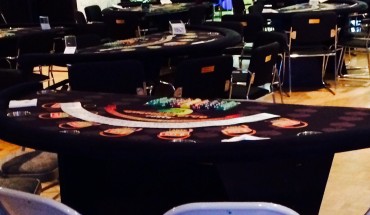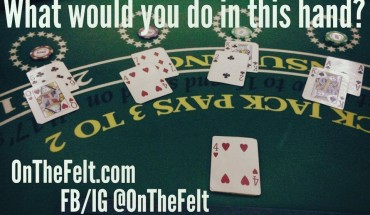So it’s your first time on a blackjack table. You know your premise is to get to as close to 21 as possible, or play in a way to ensure that the dealer busts (goes over 21) – if you don’t know this part, I’ll explain at the end. You know that the dealer must take another card on 16 or under, and stand on all 17, and you know that all royals are counted as 10 points. You even know that aces count as 1 or 11, whatever benefits the player that holds it.
You’ve got that all down, now here’s some of the other options you may not know, or understand.
Splitting
What splitting means is a player has the option of splitting their cards into two separate hands, if they are an identical pair. Choosing this route will require matching your first bet, since the new bet will be the one backing the new second hand. They are played as normal (meaning you can split again if you get another matching card, etc.) for the exception of splitting aces (which I will explain shortly).
Generally you want to split 8’s and Aces. The logic behind this is two 8’s (8+8) equals 16, which is a hard position be in. Since 25% of the deck are worth 10-point cards (10’s – kings), splitting will grant you the opportunity of changing that 16 point hand to two 18 point hands, if you do catch a 10-point card on both. If you don’t, you’re still offered some manageability. As for Aces, it’s the same theory, except in the case of aces, you will only receive one card per ace. You will not have the option of taking an additional card (the only option you will have is to split that hand again, if you match your ace with another ace). If you get a blackjack through a split, you will only get paid even money. (The blackjack 3 to 2 payout is only available with the first 2 cards dealt to that player per hand).
Doubling Down
Doubling down means you’re doubling your money to take one card from the deck. This can only be done after you are dealt your first two cards. It cannot be done after you’ve taken your first “hit” on that hand. The reason one may want to do this is if the dealer is in the position of busting (showing a 6, 5, or 4 point card) and your present hand cannot go over 21 points (your initial point total on your hand equals 11 or less), if you take another card. Understand, whenever you wish to add money on to your bet, you’re request more cards, one way or another, and generally when you do, it’s a match to whatever your present bet is. You cannot double down without taking another card.
The reason someone may want to double down is if you see the dealer is in a position to bust (remember, the dealer must take a card if they have 16 points or below, assuming that the hidden card is worth 10 points, the odds of the dealer going over 21 is a little less than 62%), and if you’re in a position where you cannot conceivably go over 21 points (remember- highest standing point value card is 10 – not counting aces, because of their flexibility), you can double your money to take one card, in hopes that the dealer will get over 21. Remember, when you double down, you only get one card.
Insurance
If you’re ever at my table, I’ll make it clear that this is a “sucker bet”, but I still have to ask. Insurance is an optional bet that must be rectified before regular game play resumes. Insurance comes into play once a dealer is dealt an ace. Once this happens, everyone has the option to buy insurance. The cost of your insurance is worth half of your initial bet. In other words, if your bet was $100, then your insurance cost would be $50 (equaling $150 total on the table). If your bet was $50, your insurance cost is $25 (equaling $75 total on the table), so on and so forth. Here’s the breakdown on what happens during an insurance play.
If your bet was $100, and you paid the $50 insurance and then…
- dealer gets blackjack, the player gets paid 2-1 on the insurance bet ($100 win on the insurance, +$50 insurance bet = $150 return) and loses the initial $100. End of hand.
- dealer doesn’t get blackjack, the $50 insurance is taken (leaving the $100 bet), and the game resumes.
If your bet was $100, and you didn’t pay the insurance and then…
- dealer gets blackjack, you lose your $100. End of hand.
- dealer doesn’t get blackjack, and then the game resumes.
The reason this is a sucker bet is that you’re betting either for or against a 10-point card hiding underneath that ace. Since aces consist of 25% of the deck, you’re betting against either the rising or diminishing percentage, depending upon how many 10 point cards have already been played. In this situation, the best you can hope for is a push, since buying insurance on a blackjack will only give you back your money. There’s no option in insurance where you can win more than you put in.
House Discretion Plays
These are plays that are not available at all casinos, however, it’s a good idea to ask your dealer if it’s allowed.
Surrender
Surrendering is an option the player can make if, instead of wanting to play their hand, they are giving up their hand, which will only cost them 1/2 of their bet. You cannot take a card and then surrender. It must be done before you make any actions in respect to your hand. Generally players will want to do this if the they are showing a 16, and have a high chance of busting or losing the hand, however it’s generally not a wise idea for a player to hold on a 16 (unless the dealer is showing a 6). Instead of making the hard choice, it may be worthwhile to surrender the hand.
Late surrender (available on Spanish 21)
Late surrender follows the same rules of standard surrendering, however, this can be done after you’ve taken one or a couple cards after your initial deal.
Double Down on Blackjack
Most people would not even consider this, and take their money and run, however some casinos do offer the opportunity. Why would someone want to do this? Well, blackjack pays 3-2. If you played $100, that means you’ll get paid $150, on top of getting your bet back (a total of $250). On that same $100, if you decide to double down, you will need to put down another $100, totaling $200 worth of your money, and if you win that hand, you’ll get paid $200, on top of getting your bet back (a total of $400). Now, if you think that’s worth it, just for another $50, understand you’re putting your chances in front of a firing squad for a diminishing 25% chance just for an incremental increase.
Side Bets
These are bets generally made on the side of someone’s bet, however they are independent of the original bet. They can be made by someone other than the owner of the hand. These are plays made against the house and are recognized by the house.
Piggy-Backing
Piggy-backing is a bet that someone makes on someone else’s hand. They are betting that the owner of that hand wins. It’s considered a separate bet and the winnings goes to the original owner of the money. When someone piggy-backs a bet, they agree to all the actions of that player to that bet, without question. If that player doubles or splits that bet, the piggy-backer must follow and match the new bets. The piggy-backer has no say in the actions of that hand. Generally this is done if someone is doing really well in a shoe and others want in on that action. The piggy-backer must meet the minimum/maximum requirements on that table, independent on the main bet. Since the piggy-backer is not the owner of the hand, however, their bet does not have to match the owner’s bet and could be more or less than that owner has on that bet, as long as it’s within the minimum/maximum requirement.
Playing for the Dealer
This is done by a player of the hand. The player places an extra chip on the side as an addendum bet, with the winnings of that addendum bet going to the dealing. The addendum bet is a tip to the dealer. An addendum bet means its an extension to the players initial bet, and because of this, it doesn’t have to meet the table requirements, as long as the main hand has already met it. Because of this, the addendum bet can be worth less than the table minimum. Unfortunately the dealer does not have a say in how the hand is to be played, but is the recipient of the winnings, if the play goes well. As with piggy backing, all double downs and splits must be recognized with a matching of the addendum bet.
For more of the basics, check out this video from one of our partners, Shawn Tinling from 21Nights Entertainment.
Side note:
On the top of the article, I mentioned an alternate game play other than getting close to 21. This is the other end of blackjack and is to be played when conditions deem it necessary.
Due to the fact that the dealer must draw on 16 and stand on all 17, means if the dealer is showing a 4/5/6 card, assuming that the dealer’s face down is a 10, the odds of the dealer busting (going over 21) is 46%/52%/62% respectively. This is when sitting out of a hand becomes a good idea.
As mentioned before in the “Doubling Down” section, there’s only one reason why you’d want to take anymore cards when a dealer is showing a 4/5/6 point card, and that’s when you have an opportunity to double your money by taking one card because it is impossible for you to get over 21 points by taking that additional card, otherwise, SIT THIS ONE OUT!
The reason why you want to do that is because you do not want to take the dealer’s bust card. For every bust opportunity you take away from the dealer, you lower everyone’s (including your own) chance to win. That 62% diminishes per every 7/8/9/10 point card you and all the other players take from the deck, and increases the chance for the dealer to get the right card to wipe out the table.
Remember, the other players at the table are not your enemies, but your allies. If all plays play correctly, everyone gets paid more often than not. In this way, blackjack becomes a cooperative game of “us against them”, making sure that the house is in the worst position possible, so that everyone benefits.
…and please note, these tips may save your life one day, because casino blackjack players a vicious! (If you screw up play, you potentially screw up their hands, and ultimately their money… just don’t walk past a dark alley alone).
From your friendly neighborhood Janifer (saving lives and money since 2004).




2 comments